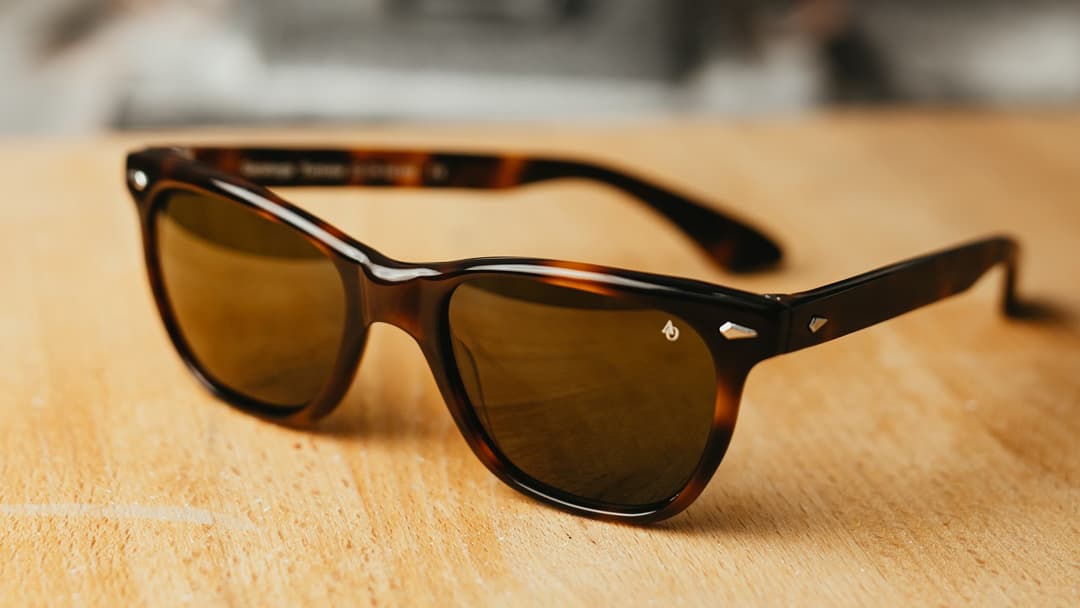
Can Wearing Sunglasses Damage Your Eyes?
Can Wearing Sunglasses Damage Your Eyes?
With summer upon us and the sun shining brighter, we're often reminded of the importance of protecting our eyes from harmful UV rays. Sunglasses have long been hailed as a stylish and practical accessory, shielding our eyes from intense light and reducing glare. However, amidst the countless benefits they provide, a question lingers: Can wearing sunglasses actually damage your eyes?
In this article, we delve into this intriguing topic to dispel common misconceptions and shed light on the potential risks associated with sunglasses usage. Exploring the science behind UV protection, lens quality, and proper usage, we'll equip you with the knowledge to make informed decisions about your eye health. Let's separate fact from fiction and discover how to enjoy the sun safely with the perfect pair of sunglasses.
First we'll look at the pros and cons to determine: Is it bad to wear sunglasses all the time?
Pros of Wearing Sunglasses All the Time

Let's start by debunking the myth: wearing sunglasses, when used correctly, does not damage your eyes. In fact, they play a crucial role in safeguarding your vision from harmful ultraviolet (UV) rays and protecting your eyes. The real concern lies in the quality and usage of sunglasses. Now let's look at the pros of wearing sunglasses whenever you're outdoors (whether it's sunny or cloudy days).
The fact is, sunglasses:
1. Provide Better Vision in the Sun
Wearing sunglasses all the time helps improve your vision in bright sunlight. They reduce the amount of intense light entering your eyes, making it easier to see clearly and enhancing your visual comfort. By reducing glare and preventing squinting, sunglasses enable you to enjoy outdoor activities with enhanced clarity.
Sunglasses come in a variety of tints, offering different benefits depending on the lighting conditions. However, dark lenses do not necessarily provide better UV protection. Instead, look for sunglasses with adequate UV filters regardless of the lens color.
2. Protect From UV Rays
One of the primary benefits of wearing sunglasses is their ability to shield your eyes from harmful UV light. Prolonged exposure to ultraviolet radiation can cause various eye problems, including cataracts, macular degeneration, and even eye cancer. Quality sunglasses with proper UV filters offer essential protection, minimizing the risk of these conditions and preserving your long-term eye health.
The way you wear and use sunglasses also plays a significant role in maintaining eye health. Wearing them consistently when exposed to sunlight, especially during peak UV hours (10 a.m. to 4 p.m.), is crucial. Additionally, sunglasses should fit properly and cover your eyes entirely, preventing the sun's UV rays from reaching your delicate eye tissues.
Choosing sunglasses with high-quality lenses is essential. Inferior lenses, such as those found in cheap, counterfeit sunglasses, may lack proper UV filters, leading to increased exposure to harmful rays. Always opt for sunglasses from reputable brands and look for those labeled as 100% UV or UV400 protection, which block 99-100% of the sun's ultraviolet rays.
3. Protect From Glare
Sunglasses are designed to reduce glare caused by reflected light. Whether you're driving, participating in water sports, or simply walking outdoors, glare can be both distracting and uncomfortable. By wearing sunglasses, you minimize glare, allowing you to see more clearly and reducing eye strain. All American Optical lenses feature a backside anti-reflective coating to prevent glare from bouncing into your eyes.
Polarized lenses reduce glare by blocking horizontally polarized light, making them popular among outdoor enthusiasts. While they improve visual comfort, it's important to note that polarization does not provide additional UV protection. So, ensure that your polarized sunglasses still have UV filters to safeguard your eyes.
4. Protect Skin Around Eyes
The delicate skin around the eyes is susceptible to sun damage and premature aging. Sunglasses act as a barrier, shielding this sensitive area from the sun's rays and reducing the risk of wrinkles, sunburn, and skin cancer. Sunglasses protect this area. By wearing sunglasses consistently, you not only protect your eyes but also maintain the youthful appearance of the skin surrounding them.
5. Make You Feel Confident
Sunglasses are a fashion statement that can instantly elevate your style and boost your confidence. They add a touch of sophistication to any outfit and can enhance your overall appearance. Wear sunglasses that suit your face shape and personal style, so you exude confidence and create a polished look.
6. Protect From Photophobia
For individuals who are sensitive to light or suffer from conditions like migraines or certain eye disorders, like macular degeneration, sunglasses can be immensely beneficial. They provide relief from photophobia (light sensitivity) by reducing the amount of bright light entering the eyes. By minimizing discomfort and visual disturbances, sunglasses enable individuals to engage in daily activities more comfortably.
7. Help You Hide Your Emotions
Sunglasses have the added advantage of concealing your eyes and providing a sense of privacy. They can be particularly useful when you prefer to keep your emotions or expressions hidden. Whether you're feeling emotional, tired, or want to maintain an air of mystery, sunglasses offer a subtle shield, allowing you to maintain your desired level of privacy.
Cons of Wearing Sunglasses All the Time
While sunglasses offer numerous advantages, it's important to strike a balance and not rely on them excessively, as prolonged use in dim conditions may hinder natural adaptation to darkness. Understanding the appropriate situations for wearing sunglasses ensures you can reap their benefits without any drawbacks.
1. Impact the Ability to Adjust to Light Variations
When you wear sunglasses all the time, you can hinder your eyes' natural ability to adapt to different lighting conditions. Constantly shielding your eyes from varying levels of light can make them less responsive to changes in brightness. This can lead to discomfort and difficulty adjusting to environments with different lighting, such as moving from a bright outdoor setting to a dimly lit room.
2. Affects Your Eye Health
While sunglasses protect your eyes from harmful UV light, wearing them excessively can have negative consequences. Our eyes need some exposure to natural sunlight to function optimally and support overall eye health. Overreliance on sunglasses may reduce the beneficial effects of sunlight, potentially affecting the production of essential nutrients and hormones in the eyes.
3. Limit Your Peripheral Vision
Wearing sunglasses can restrict your peripheral vision, the ability to see objects and movement outside the direct line of sight. Peripheral vision is crucial for situational awareness, especially when engaging in activities like driving or sports. The frames of sunglasses can obstruct your side vision, creating blind spots and potentially increasing the risk of accidents or collisions.
4. Impact the Ability to Depth Perception
Sunglasses, particularly those with heavily tinted lenses, can affect your depth perception. Depth perception allows us to accurately perceive distances and judge spatial relationships. Sunglasses alter the perception of color and contrast and can make it challenging to accurately gauge depth, potentially leading to difficulties with tasks that require precise depth perception, such as driving or playing sports.
5. Deprive You of Vitamin D
Sunlight is a crucial source of vitamin D, which is essential for bone health and various bodily functions. Wearing sunglasses for long periods, especially during periods of prolonged sun exposure, can limit the amount of sunlight that reaches your skin and eyes. This may decrease the production of vitamin D in your body, potentially leading to deficiencies if not compensated through other sources or supplementation.
6. Mess With Your Sleep Cycle
Exposure to natural sunlight during the day helps regulate your internal body clock and supports a healthy sleep-wake cycle. Wearing sunglasses excessively, especially spending time in indoor settings, may disrupt this natural cycle. By blocking the necessary exposure to daylight, it can confuse your body's circadian rhythm, potentially leading to difficulties falling asleep or maintaining a regular sleep pattern.
Can Wearing Sunglasses Indoors Damage Your Eyes?

Using sunglasses indoors generally does not cause direct damage to your eyes. However, it can have some potential drawbacks and unintended consequences (in addition to the cons listed above):
- Reduced Visibility: Sunglasses are designed to filter out a significant amount of light, including both visible and ultraviolet (UV) light. Wearing them indoors can reduce the amount of light entering your eyes, making it difficult to see clearly, especially in dimly lit environments. This can lead to temporary vision impairment and increase the risk of accidents or falls.
- Social Implications: Wearing sunglasses indoors can sometimes be seen as a social faux pas, as it may give the impression of aloofness or trying to hide something. It can hinder effective eye contact and communication, making it difficult for others to gauge your emotions or intentions accurately.
- Dependency on Sunglasses: Constantly wearing sunglasses indoors may create a reliance on them, leading to a diminished ability for your eyes to adjust to different lighting conditions. Your eyes are naturally designed to adapt to varying levels of light, and excessive use of sunglasses can interfere with this process, potentially causing discomfort or difficulty in adjusting to changing environments.
Is It Bad to Wear Sunglasses at Night?
Yes, wearing sunglasses at night is generally not recommended and can be potentially hazardous, especially if they have dark lenses. As we've discussed, when it's dark out, sunnies reduce visibility, peripheral vision, and depth perception - all key visual elements needed for night driving. Wearing shades at night also increases eye strain and eye fatigue. In dim light, your eyes naturally work harder to gather as much light as possible to enhance visibility. Wearing sunglasses at night adds an extra layer of filtration, forcing your eyes to strain further to compensate for the reduced light transmission. This can lead to eye fatigue, discomfort, and potentially headaches.
While some specialized sunglasses exist for specific low-light situations, such as driving at night with anti-glare properties, they are designed with specific lens technologies to enhance visual clarity without reducing overall light transmission. These types of glasses are typically prescribed or recommended by eye care professionals.
Get the Best Pair of Shades at American Optical Today

In Conclusion, when used correctly, sunglasses are a valuable tool in safeguarding your eyes from harmful UV light. By choosing high-quality sunglasses with proper UV protection (like American Optical sunglasses), understanding the importance of lens quality, and using them consistently, you can enjoy the benefits of stylish eyewear while protecting your precious vision. Remember, wearing sunglasses isn't just about looking cool; it's about caring for your eye health and ensuring a bright future for your eyes.
If you have any questions about how American Optical lenses protect your eyes or need a recommendation, please contact us.
10% off your first purchase
Join our email list to be first to hear about new arrivals, limited-edition drops, sales, and more! Exclusions apply.







